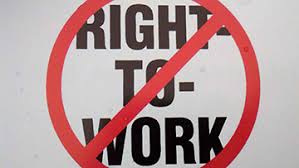 I come from a union family. I grew up in a union home. The good pay and benefits gained by one of America’s greatest unions provided for my room and board every day that I lived at home. My father and my uncles were all proud union members. My brother and some of my best friends spent their entire careers as union workers and the unions are providing them with generous pensions and great benefits. I myself was at one time the Vice President of an International Union. For all of this I am grateful.
I come from a union family. I grew up in a union home. The good pay and benefits gained by one of America’s greatest unions provided for my room and board every day that I lived at home. My father and my uncles were all proud union members. My brother and some of my best friends spent their entire careers as union workers and the unions are providing them with generous pensions and great benefits. I myself was at one time the Vice President of an International Union. For all of this I am grateful.
The right to organize is a time honored American tradition and one that I believe is guaranteed by the First Amendment to the Constitution which states, “Congress shall make no law respecting an establishment of religion, or prohibiting the free exercise thereof; or abridging the freedom of speech, or of the press; or the right of the people peaceably to assemble, and to petition the Government for a redress of grievances.” Peaceable assembly is the hallmark of American union organizing.
Some of the things we take for granted were won for us through the organization of labor in unions. Unions helped establish the concept of the weekend. Unions helped establish fair wages and relative income equality. Unions helped end child labor. Unions helped to stablish widespread employer-based health coverage. Here are a few others that can be attributed either wholly or at least partly to the impact of unions in America’s workplace: Paid Vacation, Sick Leave, 8-Hour Work Day, Overtime Pay, 40 Hour Work Week, Worker’s Compensation, Pensions, Holiday Pay, and Military Leave. That’s a pretty long and impressive list isn’t it?
I will always be the first among any to say that Unions have had a beneficial impact on American life. I will also say that the contest between the rights of workers and the rights of employers has swung like a pendulum back and forth several times and whenever it swings too hard to the employer side it is unions and organizing that gives workers the best chance to redress the balance.
Having said all this I believe I stand on solid ground when I say that I am not anti-union.
This brings me to the question that serves as the title of this column, “Why are unions against the right-to-work?”
That unions are universally opposed to right to work laws is well documented in the media. Listen to the two largest American Unions. From the AFL-CIO web site, ““Right to work” is the name for a policy designed to take away rights from working people.” On their web site the Teamsters put it this way, “Right to work is wrong for working people.” The supporters of the union war against right to work legislation say such things as: “This type of deregulation cripples the right to organize a union.” “Right-to-work laws require workers and their unions to cover the costs of non-union workers who benefit from union contracts. These laws are proven to drive down wages and weaken workers’ unions by undercutting bargaining power.” And “The real purpose of right to work laws is to tilt the balance toward big corporations and further rig the system at the expense of working families.”
This debate has been going on for a long time. James Sherk of Heritage Foundation laid out the union’s objections and the rebuttal of Libertarians quite well back in 2014:
Myth: Right-to-work laws prohibit unions.
Fact: Right-to-work laws make union dues voluntary. Without right-to-work laws, unions negotiate contracts that force workers to pay dues or get fired. Right-to-work laws protect workers’ freedom. The National Labor Relations Act also protects the right of workers in right-to-work states to unionize. Unions currently represent 4.4 million workers in 24 right-to-work states, including highly unionized Nevada, Iowa, and Michigan.
Myth: Right-to-work laws undermine unions.
Fact: Right-to-work laws make unions work to earn workers’ support. In the long run, this can strengthen union locals. Without right-to-work laws, unions can take their members’ dues for granted and provide lower quality representation. Gary Casteel, the Southern region director for the United Auto Workers, explains:
This is something I’ve never understood, that people think right to work hurts unions. To me, it helps them. You don’t have to belong if you don’t want to. So if I go to an organizing drive, I can tell these workers, “If you don’t like this arrangement, you don’t have to belong.” Versus, “If we get 50 percent of you, then all of you have to belong, whether you like to or not.” I don’t even like the way that sounds, because it’s a voluntary system, and if you don’t think the system’s earning its keep, then you don’t have to pay.
Myth: Right-to-work laws allow non-union members to “free ride” on the benefits of union representation without paying its cost.
Fact: Unions voluntarily represent non-members. The Supreme Court has repeatedly ruled that the National Labor Relations Act allows unions to negotiate contracts covering only dues-paying members. As Justice Brennan wrote in Retail Clerks v. Dry Lion Goods (1962), “‘Members only’ contracts have long been recognized.” Unions represent non-members only when they act as “exclusive bargaining representatives,” which requires non-members to accept the union’s representation. In that case, the law requires unions to represent non-members fairly. They cannot negotiate high wages for their supporters and the minimum wage for non-members. Unions can avoid representing non-members by disclaiming exclusive representative status.
Myth: Representing non-members costs exclusive representative unions a lot of money.
Fact: Unions often spend little on representational activities. When unions choose to act as exclusive bargaining representatives, they often spend relatively little on processing grievances and negotiating contracts. Often union contracts have employers cover these costs by allowing union stewards to do union business while on company time. As a result, many union locals spend very little representing workers—either members or non-members.
Federal filings reveal that in 2013 United Auto Workers Local 2164 in Bowling Green, Kentucky, spent just 2 percent of its $560,000 budget on representational activities. Boilermakers Local 107 in Brookfield, Wisconsin, spent 5 percent of its $2.0 million budget on representational activities. Machinists Lodge 2515 in Alamogordo, New Mexico, spent 23 percent of its $645,000 budget on representational activities—almost all of which constituted payments to its officers.
Myth: Right-to-work laws provide no economic benefits.
Fact: Companies consider right-to-work laws a major factor when deciding where to locate. Organizing victories bring in a lot more money for a union in jurisdictions with compulsory dues. Consequently, unions organize more aggressively in places without right-to-work laws. Companies in turn want to know they can avoid being targeted by union organizers if they treat their workers well. Right-to-work laws make that more likely. Economic development consultant’s report that roughly half of all major businesses refuse to consider locating in jurisdictions with compulsory dues. Bureau of Labor Statistics data show that between 1990 and 2014 total employment grew more than twice as fast in right-to-work states as in states with compulsory dues.
Myth: Right-to-work laws lower wages.
Fact: Workers have the same or higher buying power in right-to-work states. Opponents often deride voluntary dues as “right-to-work for less.” Average wages in right-to-work states are indeed slightly lower than in non-right-to-work states. This occurs because almost every Southern state has a right-to-work law and the South has a lower cost of living. Studies that control for differences in costs of living find workers in states with voluntary dues have no lower—and possibly slightly higher—real wages than workers in states with compulsory dues.
Myth: Right-to-work laws divide Americans.
Fact: Americans overwhelmingly support right-to-work laws. Recent Gallup polling finds Americans support right-to-work laws by a 71 percent to 22 percent margin—better than 3 to 1. Independents support right-to-work laws 77 percent to 17 percent, Republicans support them 74 percent to 18 percent, and Democrats support them 65 percent to 30 percent. Polling also shows that union members themselves support voluntary dues by an 80 percent to 17 percent margin. Voters also reward politicians who support voluntary dues at the polls. Not a single Michigan legislator who voted for right-to-work laws in 2012 lost in the next general election. Right-to-work laws remain controversial primarily among union officers—not the general public.
The arguments against right-to-work laws do not withstand scrutiny. Right-to-work laws give workers a choice over where their money goes. This freedom forces unions to earn their members’ support. It also attracts businesses and jobs. The law should not force anyone in America to pay union dues as a condition of employment.
I have a few questions for union members who follow their unions lead and oppose right-to-work. Can anyone join? Is it open to all people at all times or is union membership restricted in any way? If membership is restricted isn’t this a restraint of trade? Are union wages artificially high because they only allow so many people to compete for jobs?
Personally I believe every citizen deserves the right to work and the right to organize and I don’t believe they should be mutually exclusive. Unions should not need government coercion to exist and workers shouldn’t need to bust unions to work.
Now here’s a wild idea in the current atmosphere of confrontation and battle that is drowning America why don’t we have a civil debate about this and then let the voters decide.
 *** Dr. Robert Owens *** is a Life and Liberty News contributor, College Professor and the author of a widely published weekly opinion column, The History of the Future which can be viewed at www.drobertowens.com. He holds an Associate Degree in Biblical Studies, a Bachelor Degree in Religious Education, a Bachelor Degree in History, a Master’s Degree in Religious Education, a Master’s Degree in History, and a Ph. D. in Organizational Leadership. Dr. Owens teaches History, Political Science, Religion, and Leadership. His books include; The Constitution Failed, The Azusa Street Revival, America Won the Vietnam War, COGIC History, The More Things Change The More They Stay The Same, Then Came Trump, America’s Trojan War, and Constitutional Philosophy in Action. All these books are available from Amazon.com. Contact Dr. Owens drrobertowens@hotmail.com. Follow Dr. Robert Owens on Facebook or Twitter @ Drrobertowens.
*** Dr. Robert Owens *** is a Life and Liberty News contributor, College Professor and the author of a widely published weekly opinion column, The History of the Future which can be viewed at www.drobertowens.com. He holds an Associate Degree in Biblical Studies, a Bachelor Degree in Religious Education, a Bachelor Degree in History, a Master’s Degree in Religious Education, a Master’s Degree in History, and a Ph. D. in Organizational Leadership. Dr. Owens teaches History, Political Science, Religion, and Leadership. His books include; The Constitution Failed, The Azusa Street Revival, America Won the Vietnam War, COGIC History, The More Things Change The More They Stay The Same, Then Came Trump, America’s Trojan War, and Constitutional Philosophy in Action. All these books are available from Amazon.com. Contact Dr. Owens drrobertowens@hotmail.com. Follow Dr. Robert Owens on Facebook or Twitter @ Drrobertowens.

